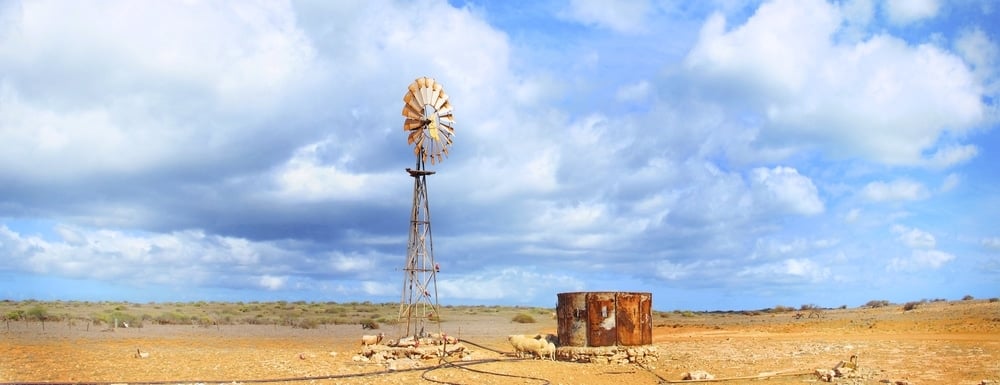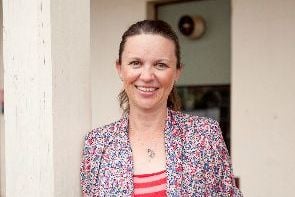
One of the stars of the ABC’s Country Town Rescue, which concluded on TV last week, experienced her own tree change when she returned to her home town of Trundle after years away travelling and teaching.
Cherie Quade is president of the Trundle Tree Change Committee, which instigated the scheme offering local farm houses to city families for $1 a week.
In early 2010 most of Trundle’s 350 residents took part in a meeting to develop a strategy to revive their dying town.
Seven years of drought had taken a harsh toll on the tiny but tough community on NSW’s wheat belt.
All three local banks, the ambulance and the butcher’s shop had closed, the hospital was understaffed, and the number of students at the two primary schools had halved in recent years.
“There are very nearby towns that we’ve seen suffer … the evidence is very close by of what happens if you don’t pull together,” Cherie says.
“We needed to do something pretty quickly and seriously to ensure the survival of the town.
“Having heard of the scheme in nearby Cumnock, the Rent a Farm House scheme, we thought, ‘Well, if they can do it, we can do it’, so why don’t we try.”
That Andrew Denton’s production company, Zapruder’s Other Films, came on board to film the scheme was a bonus, she says.
“We started to get the ball rolling, and Zapruder’s said to Cumnock: ‘If you ever hear of any other town that starts the scheme, can you let us know, because we’d love to film it from the start’.
“We needed this for Trundle, and they thought it would be a great story about the bush.”
Cherie was born and bred in Trundle and attended school there until the end of Year 10, when she transferred to Red Bend Catholic College in Forbes for senior school.

She studied environmental science at Charles Sturt University in Wagga Wagga, followed by a diploma of education. She worked in Leeton, then moved to England where she taught and travelled for a while before returning to Australia.
Cherie took up teaching at St Matthew’s Central School in Mudgee, where she worked in the secondary department for eight years.
“I only came back from Mudgee at the end of 2008,” she says. “I came back to Trundle and I was doing a little bit of farming with my dad and a little bit of casual teaching, I felt like I needed a break from teaching.
“I was in my early 30s … I had worked myself into the ground. That was purely my own doing, because you get more and more involved in your work, with more and more responsibility.
“I’ve still got a house over there, and lovely friends, but I just knew the way I was headed I was going to go a bit mental if I didn’t have some time out.”
She craved “breathing space, a chance to step back and reflect”.
“That’s really why I left, it was just a change of pace.”
Her father Colin, a farmer, and mum Karen, a teacher at St Patrick’s primary school, still live in Trundle, while her sister Wendy teaches at Red Bend Catholic College and brother Graham, another farmer, has also returned to Trundle with his family.
“We’ve all come back to our roots,” she says.
Cherie initially took 12 months’ leave without pay from Mudgee, but, with the push to revive Trundle, she opted to stay in her home town.
“It just led to wonderful things.
“When you pull back from a full-time position you know you want something else but you can’t quite pinpoint it.
“But, given the time, it comes to you.
“I am really happy that I was able to quit a full-time job and work part-time.”
Cherie says it was “lovely” to be back on the land and work with her dad again.
“It was definitely hard when I came back because there hadn’t been any rain, and there had been changes in our family farm situation, so it worked out perfectly; I was able to support Dad and he was able to support me.”
And as a secondary school science teacher, she is enjoying the challenge of teaching science to primary students.
“I’m loving it; it’s a school of only about 35 students so it’s tiny but it’s just what I love,” she says.
“I feel really at home at St Patrick’s.”
Although the locals adore their town, which boasts the longest verandah in the state – on the pub – the Trundle Tree Change Committee was unsure that Trundle would attract city families.
But when the call for applications went out, the interest was overwhelming.
“We had over 400 applicants when it was originally launched at the end of 2010,” Cherie says. “We didn’t know it was going to be so popular; it really struck a chord with people all over the world.”
The committee wanted skilled and employable parents of school-aged children, families who would become involved in the local community.
“We did say we wanted couples, because we thought one would be working and one would be able to renovate the farm house, but we ended up choosing Donna Roberts, a single mum from Canberra, because she was a good match.”
https://www.youtube.com/watch?v=pqSWGeFfNn8″]https://www.youtube.com/watch?v=K4K4czJJS-s
Although there were “testing times”, with teething problems and disagreements, Cherie says the scheme was a great success and was boosted by good rainfall in the district.
“It’s been good timing, we’ve had a good couple of seasons on the farm, so the dots have been connected, which is wonderful,” she says.
“The tangible kinds of things it’s brought to Trundle are that we’ve had a chemist open in the town, we’ve had the senior rugby league team reform after five years, and we’ve
maintained staff at the school.
“They’re on committees, they are really active in the community. Donna, the single mum, she’s on about three committees.
“In terms of an undercurrent, we’ve seen this amazing sense of pride throughout the town; Trundle is on a high.
“We didn’t turn it on, either; we didn’t bring out the dancing girls.
“We just said: ‘Well, look, we’d love you to live here but it’s your choice …’ and they’ve made a go of it. They make us feel really good about living where we do.
“We feel so happy and chuffed that they chose to live here, and they still do. And they are friends.”
Trundle’s main street has also undergone a facelift, with verandahs and awnings replaced and the local “picture theatre” refurbished.
“I think you could suggest anything in Trundle at the moment and someone would say: ‘Oh bugger it, let’s give it a go!’
“The publican has been a breath of fresh air; that pub now is the focal point of the town, and before Danielle and her family came we didn’t even go there. Now it’s very family friendly.”
One family, the Elemams, became the first Muslims in Trundle when they made their tree change.
“We were nervous, definitely, but they just read so well and they just interviewed so well,” Cherie says.
“I think we were surprisingly – and pleasantly so – accepting of this new culture. I was really stoked. We had a community get-together where people could go and listen [to the family explain their faith and culture], and they’ve been a great influence on Trundle.”
Cherie also works for Style, a quarterly magazine which reflects the lifestyle of women in regional NSW.
“A girl from Condoblin started the magazine by herself and I was her first official employee and it’s grown from strength to strength,” she says. “It’s been a lovely little balance for me, I get to be creative and look at fashion. It’s a lovely reflection of the bush, that magazine.”
Cherie is engaged to Bill, a builder, and is planning an October wedding.
“We’d like to start a family but I can see the balance working really well, because there’s flexibility about the magazine and part-time teaching, and it just seems like a really good mix,” she says.
In the recent school holidays Cherie ccompanied her sister Wendy and a group of Red Bend students on a modern history excursion to Vietnam.
“I love travelling, that’s the third time I’ve been there. It’s been a wonderful thing to do with Wendy. I got home yesterday and I keep looking behind me for 20 kids to be following me!”
Cherie is still involved with the Trundle Tree Change Committee, which hopes to draw new people to the town by enhancing local business opportunities.
They plan to capitalise on the success of the plan that has brought new life to a small town.
“The town seems revitalised, which is hard to measure, but you can feel it.”
